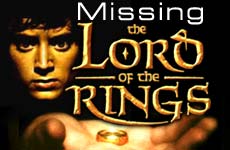 You Know More Hebrew Words Than You Think
You Know More Hebrew Words Than You Think


5 min read
Evil and the cultural significance of Tolkien's masterpiece.
Tolkien disliked allegory. He thought it a sterile and predictable genre. Yet, many readers of his The Lord of the Rings (LOTR) have been unable to resist allegorical interpretations, the most popular of which see the work as a Christian allegory or as an allegory for the great wars of the early 20th century. Like the original book, the film version of LOTR has inspired wildly varied interpretations, many of them attempting to make some contemporary connection. But all the ones offered thus far distort the peculiar nature of the quest in LOTR and its teaching on evil.
Many critics have drawn connections between LOTR and America in the wake of the atrocities of September 11. In the Boston Globe, Jay Carr called the fellowship of nine "freedom fighters." Andrew Sullivan's website hosted a discussion about whether Bush is closer to Frodo or Sam. (After initially leaning toward Frodo, Sullivan opted for Sam.) There are parallels here. Both dramas feature ordinary citizens and leaders, shaken from their commonplace lives by an invading evil; after an initial shock, they commit themselves to a cause, and, in so doing, discover in themselves resources they never knew they possessed. There is also a similarity in the way diverse peoples, while never forgetting their particular homelands, put aside differences to fight against a common enemy.
But the comparison obfuscates the nature of the quest in LOTRM and the peculiar evil that the ring embodies. The task in LOTR is not to hunt down and punish an enemy but to destroy the instrument that could give the enemy absolute power. And the dangers the ring-bearer faces are as much internal as external. Some of the members of the fellowship are themselves tempted by the lure of the ring, for different reasons but all out of a desire to do good. The most tragic figure is Boromir, one of the two human members of the fellowship, who wants to use the power of the Ring to defend his people from the evil Sauron. His desire for the ring occasions his own death and the splitting of the fellowship.
LOTR's teaching about evil runs counter to the suppositions that nothing is truly evil in itself.
The great lesson of LOTR is that the use of certain means or instruments is always evil, corrupting the one who deploys them, no matter what apparent good may come from them or be intended in their use. When the New York Times critic Elvis Mitchell describes the ring as being so powerful that "even the towering Gandalf" is afraid of it, he gets it exactly backward. The truth is that it is especially Gandalf who fears the ring, because he is acutely aware that the ring is a particularly potent corruptor of the powerful, who might be deceived into thinking they can wield its power without being destroyed by it. The point is driven home in an early scene where Frodo, realizing his possession of the ring has made him a target of the evil powers, offers Gandalf the ring. Gandalf, who up to this point has appeared as an avuncular, playful wizard, becomes suddenly fierce with Frodo. He commands Frodo not tempt him with the ring. Gandalf, who won't even touch the ring, admits that, were he to take it, he would do so out of a "desire to do good" but through him it would wreak a "great and terrible" evil.
LOTR's teaching about evil runs counter to the suppositions that nothing is truly evil in itself, that only weak and ignorant individuals are terrified by things labeled "evil," and that clever individuals with good intentions can put any means to a good end.
Another interpretation -- the one the actors and the director, Peter Jackson, seem to favor -- is ecological. It holds that the difference between good and evil in LOTR hinges upon different relationships to nature, with the good existing in harmony with nature while the evil are indifferent or hostile to nature, using it as raw material to satisfy inordinate longings for greed and power. The interpretation finds support in the film and perhaps even more in the book. Greed is undeniably a deadly vice in LOTR; the Dwarfs' lust for riches in the mines of Moria awakens an ancient evil. Recall the scene in the film where the traitorous wizard Saruman, once friend and now nemesis of Gandalf, commands his underlings to destroy the trees to feed the fires he needs to forge a new creature, a mixture of human and Orc. What ensues is a panoramic shot of massive deforestation.
But the ecological interpretation, especially if it is understood in a standard liberal way, misses the mark. The greatest danger is not the depletion of natural resources but the moral destruction of the human species and other rational species. Tolkien's heroes are not autonomous creators but those who humbly embrace their role within a natural and even a supernatural order not of their own devising. Saruman's cloning project, his attempt to remake life, even human life, in his own image and likeness or at least to serve his own needs mirrors the project of Sauron himself, who is animated by a "will to dominate all life." Is there a contemporary analogue to this? Certainly. It is already underway in the proclamation of a disembodied sexual liberty, in the practice of selective abortion, and in the push for greater freedom in genetic experimentation, including even cloning. Of course, these practices are pursued not in the manner of Sauron, out of a malevolent intention to dominate the world; instead, their supporters appeal to progress, freedom, and compassion. But the presence of the best of intentions, if we are to take seriously the teaching of LOTR, in no way insures that we will not wreak a great and terrible evil.
This article originally appeared in www.nationalreview.com
